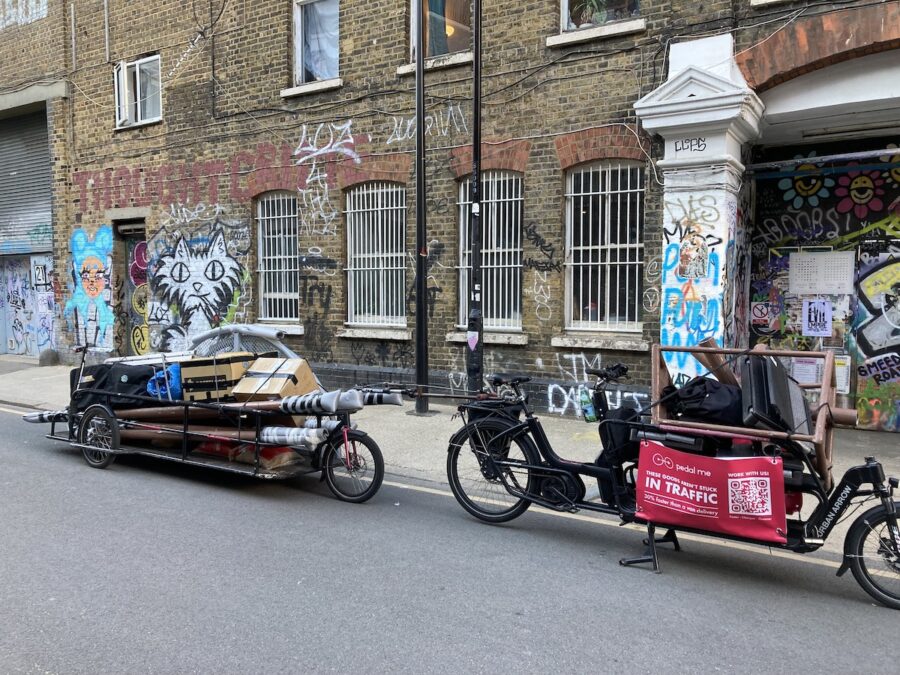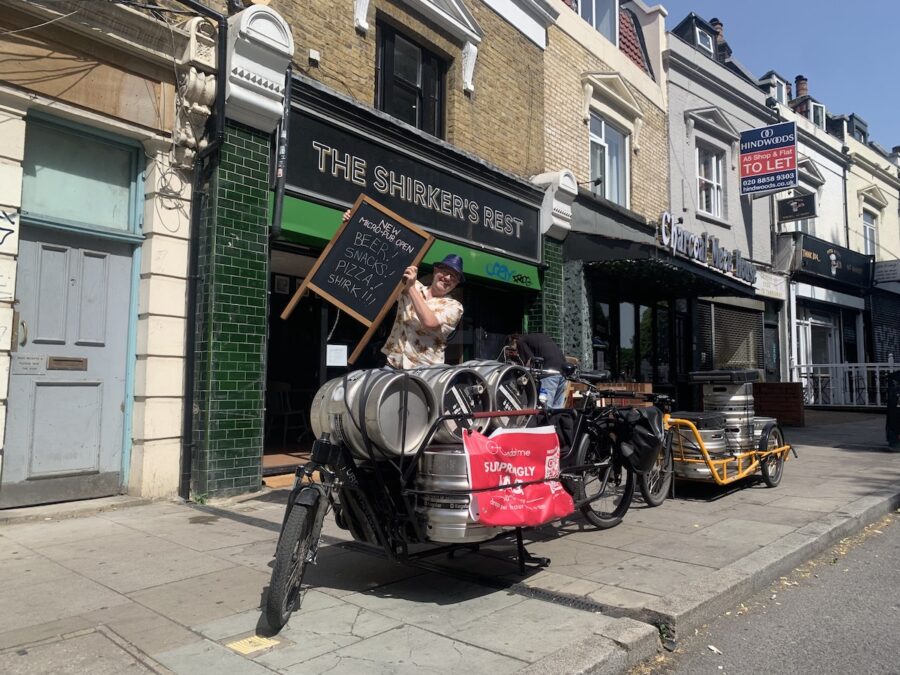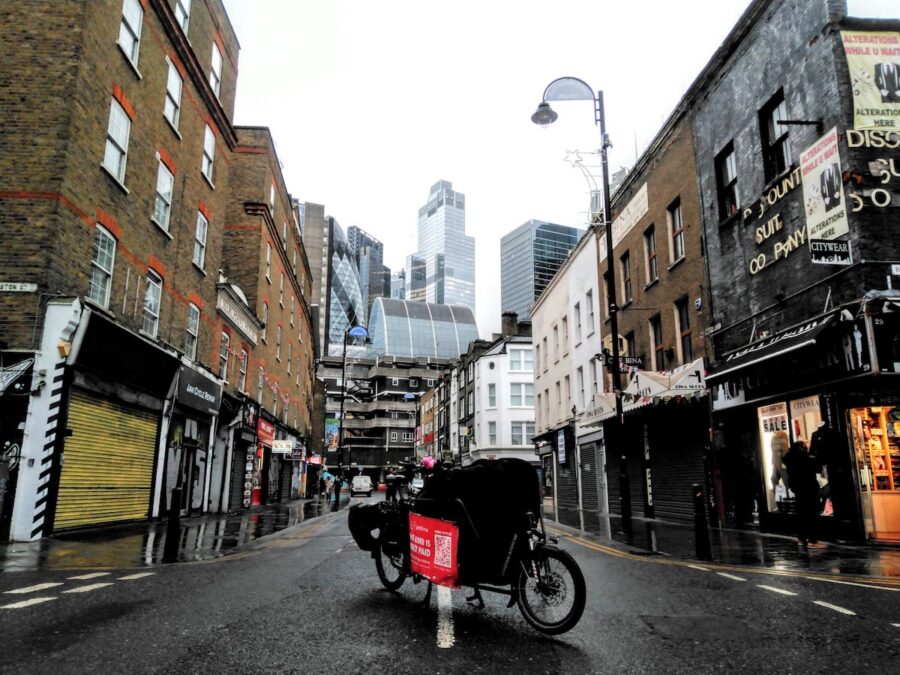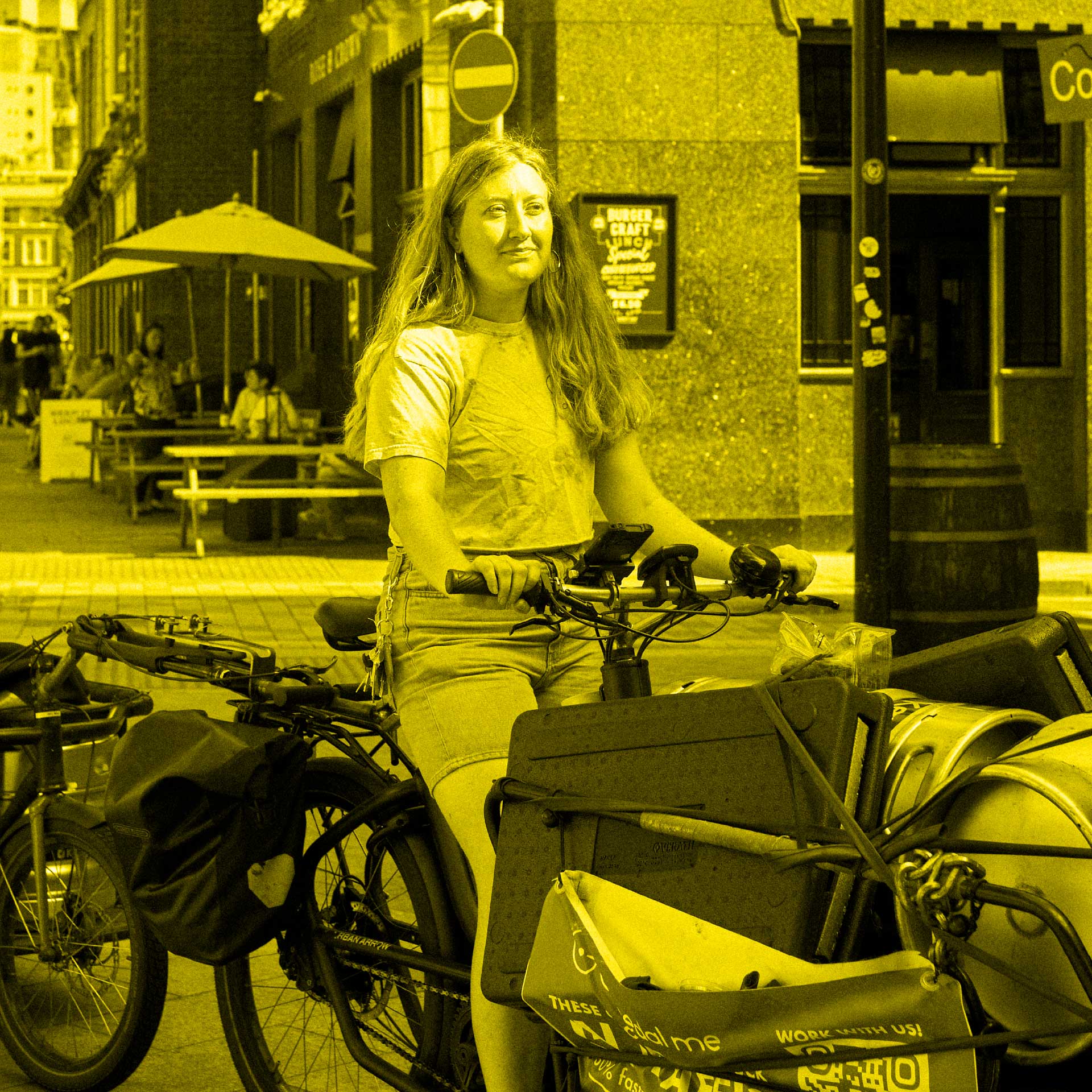8 min. read
Fiona O’Keeffe is the current Head of Operations at Pedal Me, a cargobike delivery company operating in London who are pushing the boundaries of what it means to be a mover in the city.
—
What is the background of Pedal Me?
Pedal Me started primarily as a bike-taxi company with the idea of transporting people by bike. Our bikes were designed specifically for us to carry up to two passengers, but in reality, the bulk of our jobs comprise of cargo delivery of goods. We can carry up to 150 kilos of cargo on the front of the bike, and we also have a range of trailers that allow us to carry up to 300 kilos between the bike and the trailer. Our primary activity includes transporting goods between businesses, and from businesses to customers. We do a really wide range of jobs all over the city, operating usually within a 10-mile radius of the city centre with very little difficulty, and in special cases, we complete jobs that go beyond the outer limit.

Could you talk about the climate for cargo bikes and delivery in London?
London as a city to operate in has changed a lot within the last 10 to 15 years in terms of cycle infrastructure. However, PedalMe riders aren’t restricted to the cycle lane, often out of necessity. There are certain areas of the city that might be more recently developed or which were designed with trucks in mind, that make it logistically difficult to navigate for a cargo bike, but our riders are well-trained in how to navigate these roads. The cycle network tends to be designed with smaller bikes in mind, and often includes routes that may be on canals or other unsuitable paths.
Sometimes riders run into issues when they first start at Pedal Me if they’re relying too much on Google Maps for example, which struggles to differentiate between the bicycle and car routes, making it a challenge for cargo bikes, especially those with trailers. But once you get to know the different areas of London, it gets easier – it’s less about the physical infrastructure and more about learning how to navigate the existing roads properly. We focus heavily on training, so our riders are comfortable riding on any roads that are suitable for bikes – we probably make more use of bus lanes than bicycle lanes.
Are there other challenges that PedalMe faces that are more cultural as opposed to products of the physical environment?
What we work really hard on is positioning ourselves on the road in a way that’s assertive, but also very respectful of the other road users around us. This is really the only way to navigate the streets when there are no designated areas for bicycles, or when those designated lanes aren’t suitable for cargo bikes. It’s a delicate balance.
In terms of culture, the issues that riders might face on the road are often issues with general harassment; often towards female or non-binary members of staff. This can happen purely as a result of that person being out in public, which is then amplified by the fact that they’re in a bright pink uniform. This is a wider societal issue, and as the cargo bike boom continues, it’s becoming more of an issue that needs to be addressed for us. When the street is your place of work, it should be a safe place of work. This is a difficult thing to navigate for us as a company that puts our riders into those spaces every day.

Would you say that ensuring safe cycling for you looks less like a bike lane and more like an awareness campaign?
I think so. Even though it would be great to see areas of London with car-free zones, for us it’s less about having or restricting options and more about people understanding that cycling is the way that makes the most sense to do things. Policy changes that mean that businesses have to use cargo bikes in certain areas would be also beneficial, but again, we want this to come about through growing public demand rather than the politics of infrastructure.
It is clear that PedalMe’s mission is connected to the streets you use and communities you serve.
We believe in cargo bike deliveries being the option that just makes the most sense logistically, as well as bringing about benefits to the city in terms of lower emissions and opening up streets to pedestrians and cyclists.
As well as being the quickest way to get items from A to B, Pedal Me is one of the few companies that employ riders on a contract basis. Instead of employing riders on a zero-hour contract or a gig economy platform, we’re nurturing our riders, enabling them the security to learn to use the street in a certain way and focus on quality of work, as opposed to purely having a focus on speed.
Anybody who’s currently on our operations team salaried staff – directors aside – is somebody who started as a rider. This career progression means that our admin team has a strong understanding of the business on the ground, having started on the cycling side. We’re careful now that riders doing extra work are rewarded differently to their rider hourly rate, plus commission. We’re also at a point where we can be selective about who we train to work for us. Taking into account gender and background is something that we do, but actually, I think if the sector is given adequate funding to grow, then this growth will enable fairer employment overall.
We don’t have a large pool of riders that we can pull upon when we need, so we’re really careful about how many riders we employ at a time and don’t take on more riders unless there is a genuine need. It’s something that has to be carefully monitored, so it’s a commitment that has been set from the get-go. We keep riders and have many that have worked with us for over two years, which means that we can trust them to use the streets in a way that promotes what we’re about. We have a responsibility to respect the roads, and we have consistent performance management tools that allow us to flag when riders aren’t honouring these rules, rather than just flagging delivery times.

Prioritising the wellness of employees seems to have a positive impact on the wellness of the city and communities they’re serving.
We have feedback that even when someone hasn’t been a rider for that long, they quickly develop a closer relationship with the city.
I was employed as a rider for the first 16 months of my time at Pedal Me, and I quickly got to know certain people from being on the street all the time. Whether it was other Pedal Me riders or business owners I would deliver to, I found myself waving at random people while I was cycling around London which never happened before, and only happened as a result of my work.
Outside of direct work, being given free use of the bike also means that Pedal Me riders are incentivised to do good deeds around work deliveries. Whether it’s helping a friend move something from A to B or giving people in need lifts. We even had a rider during the pandemic use their bike to deliver school meals locally in their neighbourhood. The city becomes a community through the bike, and as we’re so visible on the street, Pedal Me becomes a champion for that.
What was the journey towards forming these goals and structures that you now work with?
The seed of Pedal Me was planted through the meeting of a number of the original co-founders and original employees connected to local council cycle training. There were a number of schools that needed bikes; such as for kids who were learning how to cycle. I think one of the first trailer jobs that was done was transporting these bikes between schools, which is still a job we do today, so the community element has always been present. In terms of surviving ethos, that’s something that’s very much there; doing things out of goodwill for the sake of the community and promoting cycling generally is something that’s carried through from the beginning. In terms of pay and commission, that’s something which developed more organically as we try to keep in mind what other companies are doing but also be as fair as possible.

Are there any last points you would like to add or hopes for the future of logistics and cycling in general – or for Pedal Me?
We’re hopeful that cargo cycling logistics is seen less and less as a novelty and more as what it is – the most efficient way to move things from A to B – and that the city can develop policies which facilitate that. This would in turn mean that it’d be less difficult for all companies to employ riders fairly and that the industry can be given the space and funding to grow as it should. There are lots of businesses that use us on a daily basis and they’re not using us because it’s a novelty; they’re using us because we’re the fastest way and it makes the most sense for their deliveries. If it can be viewed more widely that way, that would allow every other element to flourish as well.
All Images: Pedal Me

